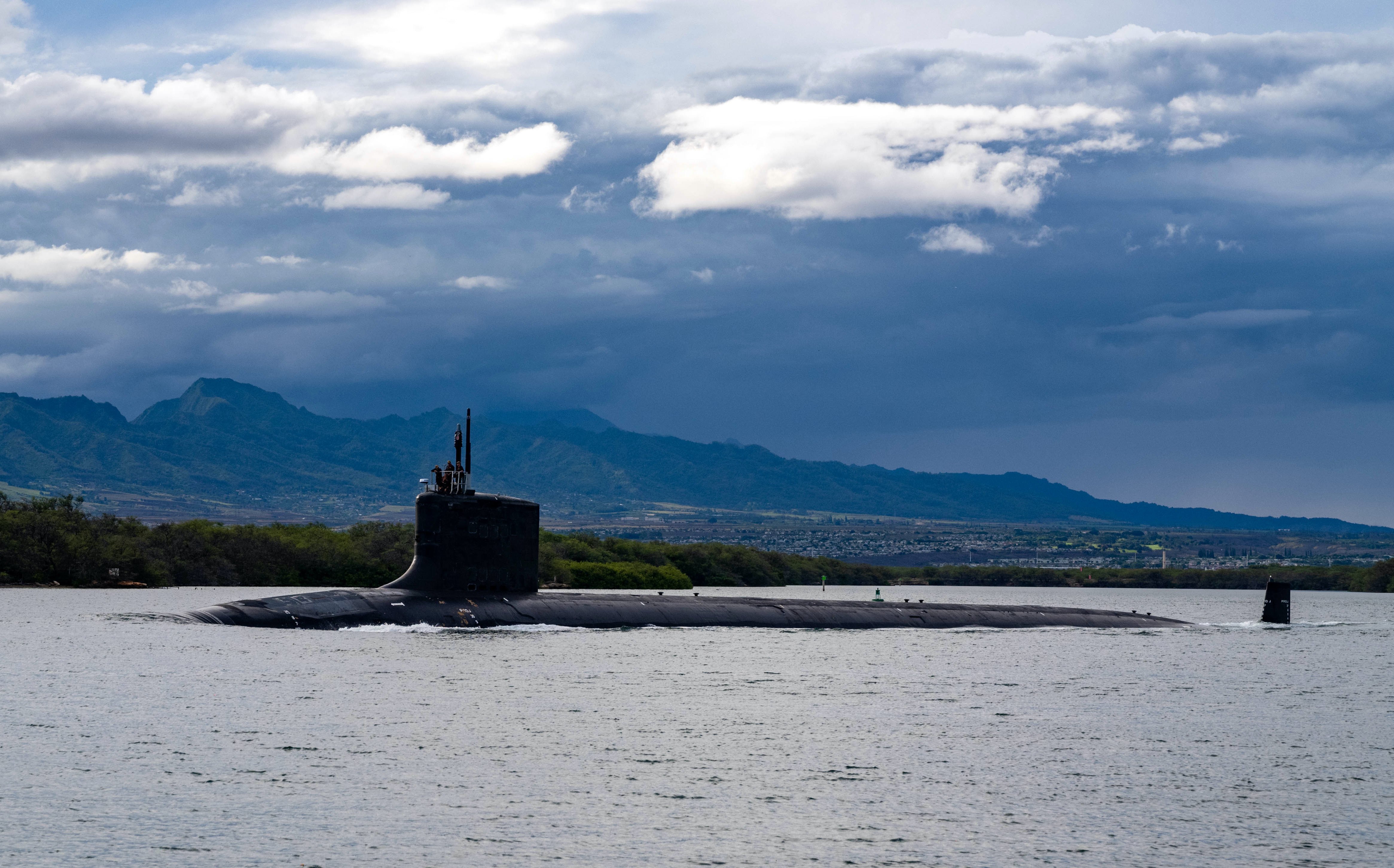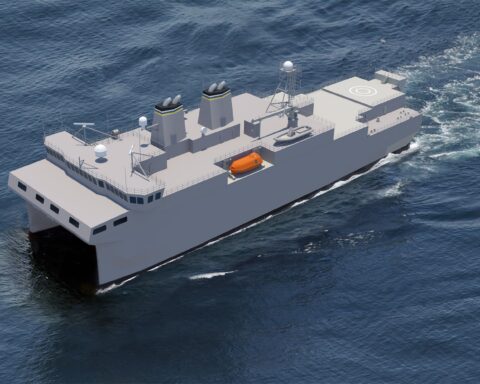The following is the May 1, 2019 Congressional Research Service report, Navy Ford (CVN-78) Class Aircraft Carrier Program: Background and Issues for Congress.
From the report
CVN-78, CVN-79, CVN-80, and CVN-81 are the first four ships in the Navy’s new Gerald R. Ford (CVN-78) class of nuclear-powered aircraft carriers (CVNs).
CVN-78 (Gerald R. Ford) was procured in FY2008. The Navy’s proposed FY2020 budget estimates the ship’s procurement cost at $13,084.0 million (i.e., about $13.1 billion) in then-year dollars. The ship received advance procurement (AP) funding in FY2001-FY2007 and was fully funded in FY2008-FY2011 using congressionally authorized four-year incremental funding. To help cover cost growth on the ship, the ship received an additional $1,394.9 million in FY2014- FY2016 and FY2018 cost-to-complete procurement funding. The ship was delivered to the Navy on May 31, 2017, and was commissioned into service on July 22, 2017. The Navy is currently working to complete construction, testing, and certification of the ship’s 11 weapons elevators.
CVN-79 (John F. Kennedy) was procured in FY2013. The Navy’s proposed FY2020 budget estimates the ship’s procurement cost at $11,327.4 million (i.e., about $11.3 billion) in then-year dollars. The ship received AP funding in FY2007-FY2012, and was fully funded in FY2013- FY2018 using congressionally authorized six-year incremental funding. The ship is scheduled for delivery to the Navy in September 2024.
CVN-80 (Enterprise) and CVN-81 (not yet named) are being procured under a two-ship block buy contract that was authorized by Section 121(a)(2) of the John S. McCain National Defense Authorization Act for Fiscal Year 2019 (H.R. 5515/P.L. 115-232 of August 13, 2018). The provision permitted the Navy to add CVN-81 to the existing contract for building CVN-80 after the Department of Defense (DOD) made certain certifications to Congress. DOD made the certifications on December 31, 2018, and the Navy announced the award of the contract on January 31, 2019. Compared to the estimated procurement costs for CVN-80 and CVN-81 in the Navy’s FY2019 budget submission, the Navy estimates under its FY2020 budget submission that the two-ship block buy contract will reduce the cost of CVN-80 by $246.6 million and the cost of CVN-81 by $2,637.3 million, for a combined reduction of $2,883.9 million (i.e., about $2.9 billion). Using higher estimated baseline costs for CVN-80 and CVN-81 taken from a December 2017 Navy business case analysis, the Navy estimates under its FY2020 budget submission that the two-ship contract will reduce the cost of CVN-80 by $770.9 million and the cost of CVN-81 by $3,086.3 million, for a combined reduction of $3,857.2 million (i.e., about $3.9 billion).
CVN-80 was procured in FY2018. The Navy’s proposed FY2020 budget estimates the ship’s procurement cost at $12,335.1 million (i.e., about $12.3 billion) in then-year dollars. The ship received AP funding in FY2016 and FY2017, and the Navy plans to fully fund the ship in FY2018-FY2025 using incremental funding authorized by Section 121(c) of P.L. 115-232. The Navy’s proposed FY2020 budget requests $1,062.0 million in procurement funding for the ship. The ship is scheduled for delivery to the Navy in March 2028.
Prior to the awarding of the two-ship block buy contract, CVN-81 was scheduled to be procured in FY2023. Following the awarding of the two-ship block buy contract, the Navy has chosen to show CVN-81 in its FY2020 budget submission as a ship to be procured in FY2020 (as opposed to a ship that was procured in FY2019). The Navy’s FY2020 budget submission estimates the ship’s procurement cost at $12,450.7 million (i.e., about $12.5 billion) in then-year dollars. The Navy plans to fully fund the ship beginning in FY2019 and extending beyond FY2026 using incremental funding authorized by Section 121(c) of P.L. 115-232. The Navy’s proposed FY2020 budget requests $1,285.0 million in procurement funding for the ship. The ship is scheduled for delivery to the Navy in February 2032.
The Navy’s FY2020 budget submission proposes to not fund the mid-life nuclear refueling overhaul (called a Refueling Complex Overhaul, or RCOH) for the aircraft carrier CVN-75 (Harry S. Truman), and to instead retire the ship around FY2024 and also deactivate one of the Navy’s carrier air wings at about the same time. On April 30, 2019, however, Vice President Pence, during a visit to CVN-75, stated the following: “We are keeping the best carrier in the world in the fight. We are not retiring the Truman. The USS Harry S. Truman is going to be giving ‘em hell for many more years to come.”
Oversight issues for Congress for the CVN-78 program include the following:
- the Navy’s proposal—if it has not been withdrawn by Vice President Pence’s April 30 statement—to not fund the CVN-75 RCOH and instead retire CVN-81 in FY2024 and its associated air wing at about the same time;
- DOD’s decision to show CVN-81 in its FY2020 budget submission as a ship to be procured in FY2020, instead of a ship that was procured in FY2019;
- the Navy’s decision, as part of its FY2020 budget submission, to not accelerate the scheduled procurement of CVN-82 from FY2028 to an earlier fiscal year;
- whether to approve, reject, or modify the Navy’s FY2020 procurement funding request for the CVN-78 program;
- the date for achieving the Navy’s 12-ship force-level goal for aircraft carriers;
- cost growth in the CVN-78 program, Navy efforts to stem that growth, and Navy efforts to manage costs so as to stay within the program’s cost caps;
- Navy efforts to complete the construction, testing, and certification of the weapons elevators on CVN-78;
- additional CVN-78 program issues that were raised in a December 2018 report from the Department of Defense’s (DOD’s) Director of Operational Test and Evaluation (DOT&E);
- whether the Navy should shift at some point from procuring large-deck, nuclear-powered carriers like the CVN-78 class to procuring smaller aircraft carriers.
Download the document here.





